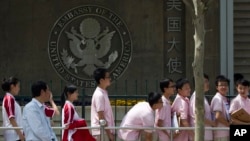Student Union
- By Megan Hatch
Social Media Stars Promote Comfort During COVID-19
Karolina Chorvath created her Instagram account while at Northeastern University in the early days of social media for the same reasons as everyone else: to share images and connect with friends.
But after being diagnosed with Crohn's disease, she used the platform to talk about her health. Now, she's a 26-year-old Instagram influencer — @karolinakristina — with more than 12,000 followers.
Influencers like Chorvath are paid to promote content on their social media accounts. Irene Kim, a 32-year-old South Korean model and fashion influencer, was among a sea of millions before she started on Instagram. She has amassed a following of 1.7 million and has been posting about COVID-19 awareness.
While the coronavirus has crushed influencers who post about retail, dining and travel — the holy trinity of influencing — Chorvath has seen her promotion fees increase because she writes about health issues.
"My monthly and yearly income has drastically ebbed and flowed over the past years, both as I changed my career and my following grew," Chorvath said about her annual earnings from influencing.
Brent Smith, marketing professor at Emerson College, said that during this time marketers should be sensitive in presenting brands and promoting products.
"With over 14% unemployment in the U.S., many consumers are focused on necessities relating to food, shelter, and basic health needs," Smith said. "Consumers understand that businesses need to make money, but they still want to see some kind of empathy to accompany the marketed product."
Chorvath — a third-culture journalist and influencer — has lived in Poland, the Netherlands, Belgium and Michigan before landing in Boston. While she shifted to endorsing mostly beauty products and fashion in 2016, she's talking more about her health battles with Crohn's disease and chronic illness.
More companies have reached out during the quarantine because she's one of the few influencers who has chronic illness. Having spent a lot of time isolated and in pain, she knows how to get through unbearable times.
"When the pandemic started, I didn't just continue to post skin care and beauty and fashion," Chorvath said. "I was really posting about meditation and mindfulness and that has been hopefully helping. ... It would be my honor if that could be the influence that I make during COVID, people can come to my Instagram account and feel validated or calmer or less alone."
Being paid to influence followers toward a product or service is an unregulated field. Taylor Lorenz, a technology and internet culture reporter at The New York Times, has written about the risks and legalities around imposters on Instagram. Lorenz has written that there's no legal recourse for Instagram.
Young entrepreneurs use the role of influencer to promote their brand, like 23-year-old Grace Beverley — @gracebeverley — who has 1 million followers on Instagram. From her influencer fame, she started her own fitness clothing company and was featured in Forbes 30 Under 30, which touts GenZ and millennial businesspeople.
Another influencer, 31-year-old Iranian Negin Mirsalehi — @negin_mirsalehi — has 5.9 million followers. She started her hair company, Gisou, also featured in Forbes 30 Under 30, after body sculpting and cosmetic surgery enhanced her image.
But like the industries they promote, many influencers have seen revenue declines during the COVID-19 pandemic.
"Top profiles that can charge $10,000 or more per post for every million followers have seen customary revenue streams drop drastically, even to zero," according to Bloomberg News.
Helene Heath, a Brooklyn-based fashion and beauty blogger from Canada — @heleneisfor — with more than 14,000 followers, has far more time during the quarantine to think about the messages she wants to convey to her audience.
"This whole new freedom in schedule is also allowing me to reflect more on the space I occupy and the value I bring to my community, versus always feeling like I'm one step behind and trying to keep up during the hustle and bustle of real life," Heath said.
Fashion and beauty influencer Brooklynn Gallagher — @brooklynngallagher — is a 26-year-old who hails from Vancouver and is based in New York City. She said more brands have reached out to her during quarantine.
"It's not something I expected but it has been beneficial for me personally as I've had much more time on my hands to create content," said Gallagher, director of growth at Bulletin. "Normally, I create content on the weekends, as I work full time during the week ... so this has opened up a lot of time for me."
Chorvath, Heath and Gallagher agreed they are more careful and sensitive about how they promote themselves during the pandemic and quarantine.
"I have also said no to a couple of partnerships, specifically affiliate programs, because it doesn't feel right to push my followers to buy right now," said Gallagher. "I think the most important thing for influencers right now is to promote positivity and to be a place where people can come to and still feel connected — being a person/place where people can find comfort is essential right now."
Influencers said companies would be smart to create more genuine content and actively build communities and create new platforms on new social media such as TikTok during COVID.
"There are some brands, however, who have used this as an opportunity to better connect with their audiences, and reach out and teach them things that could potentially help them get through this and I think that's fantastic," Chorvath said.
Heath said influencers with a voice and large platform on Instagram should have a responsibility to help and support their communities of followers.
"Their community looks up to them, and they can set the tone for positivity and action in the midst of a global crisis, using their influence for the greater good within their niche," said Heath. "I think it's time to show just how powerful their voices are."
"We are literally in isolation right now, and a lot of people need positive vibes in their life, and whether or not that's coming from Instagram, being a person/place where people can find comfort is essential right now," said Gallagher.
Madeline Joung contributed to this report.
See all News Updates of the Day
- By Dylan Ebs
International students find community during Pride Month
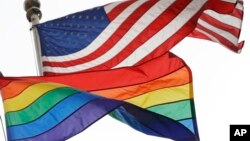
For LGBTQ+ international students, Pride Month, observed in June, is a unique time to reflect.
They hold on to multiple identities — both their LGBTQ+ identity and their cultural background — but coming to terms with them is not always easy.
For graduate student David Zhou, these identities can feel conflicting as transgender rights in China remain a controversial issue and spaces for LGBTQ people close. Zhou, 25, is transgender and pursuing an education in the STEM field at an urban university in the Midwestern United States.
VOA is using a pseudonym for Zhou’s first name and is not naming his university to protect his identity due to safety concerns back home in China. Zhou is not open about his transgender identity to his family.
During Pride Month, Zhou said he attended multiple LGBTQ+ events in his community and is surrounded by a supportive group of LGBTQ+ students who can relate to his experiences. But he’s not open about his identity to everyone on campus and said he doesn’t disclose his preferred pronouns to everyone to avoid transphobic comments.
“I feel like I have to make some judgments of the character of that person to see if they’re a good person to disclose [my identity] to,” Zhou said.
Zhou’s Pride Month celebrations included attending local markets with LGBTQ+ vendors and hanging out with his LGBTQ+ friends.
“They normalized being trans and for a long time I feel like trans identity is, should I say a vulnerability, brings me fear and worrying about discrimination, but having those events are helpful because it allowed me to see that queer people could just [live] openly,” he said.
At social events where few international students are present, Zhou said it can be tough to fit in.
“There's a lot of times like when they were talking about things I kind of, don't really understand, mostly because I kind of lack some background experience or knowledge,” he said.
Zhou said he is not aware of specific groups for LGBTQ+ international students at his university, but said international students are more prevalent in graduate programs and therefore find representation in organizations for LGBTQ+ graduate students.
In China, transgender individuals must obtain consent from an “immediate family member,” even for adults hoping to transition, which critics say limits the autonomy of transgender individuals while supporters say the policy protects doctors from violence by upset parents.
Struby Struble, a former coordinator of the University of Missouri LGBTQ+ Resource Center, told NAFSA: Association of International Educators in 2015 that LGBTQ+ international students face a “double barrier” on campus.
“With their international student friends, they feel isolated because they’re the LGBT one,” she said. “But then among the LGBT students on campus, they feel isolated because they’re the international one.”
Nick Martin, associate director of the Q Center, Binghamton University’s LGBTQ+ student support office, said when international students tour the center, there’s often a sense of hesitation as they enter a type of space that may not be present in their home country.
“I compare that to a year in after they've come into the space, they've again, maybe come to some of our events, they've got more connected,” he said.
Martin said graduate students have a unique interest in the Q Center as they may use the office for research and advocacy purposes that align with their studies.
“For older students, there may be hesitancy in a different way, but I think it's more in the vein of they want to do some of the advocacy work,” he said.
Martin said he thinks about how both his office and BU’s international student office can support students who come from countries with few — if any — protections for LGBTQ+ individuals.
“It's been a learning process of what those students really need, but I think I've kind of learned that a lot of students are just looking for the safe space that we offer,” Martin said.
- By VOA News
International students discuss US campus culture shock

International students at De Anza College in Cupertino, California, talked about culture shock in an article in La Voz News, the student newspaper.
"It felt like a major culture shock. Everything was so different, from academics to mannerism," said a student from Mexico.
Read the full story here.
These are the most expensive schools in the US
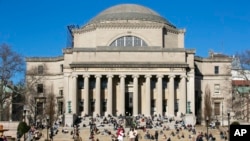
High tuition costs along with housing and food expenses can add up for students at U.S. colleges and universities.
MSNBC looked at the most expensive schools in the country, with one costing more than $500,000 for a bachelor’s degree. (June 2024)
Uzbekistan students admitted into top US universities
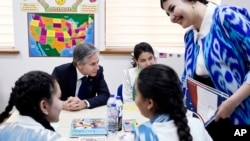
Students from Uzbekistan are among the international students admitted to top colleges and universities in recent years.
Gazata.uz profiled some of the Uzbekistan students attending Harvard, Brown, Princeton and other U.S. universities. (June 2024)
- By Stella Hsu
Reports of visa checks, deportations worry Chinese STEM students in US
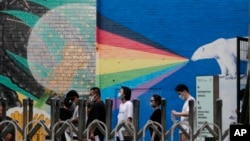
Geopolitical tensions and growing competition in tech between the United States and China appear to be spilling over into academia despite commitments from the world’s two biggest economies to boost people-to-people exchanges.
The United States remains the top choice for Chinese students seeking to study abroad with nearly 300,000 studying in American colleges and universities during the 2022-2023 school year. But reports of some cases that students and professors are facing extra scrutiny while passing through immigration and the deportation of others are raising concerns.
For Chen Xiaojin, a doctoral student studying semiconductor materials at a university in the Washington, D.C., metropolitan area, it has been six years since she returned to her hometown of Beijing.
At first, it was the COVID-19 pandemic that kept her from going home. But over the past two years, she has been deterred by accounts of Chinese students majoring in science and engineering being required to reapply for their visas upon returning to China.
She also says she is worried by reports over the past six months of Chinese students being deported, even at nearby Dulles Airport.
"My current research is relatively sensitive, and my boss [adviser] is getting funds from the U.S. Department of Defense, making it even more sensitive,” she told VOA. "I am afraid that I won't be able to return after I go back [to China]."
Chen says that if she did return to China, she would have to apply for a new visa.
In a report late last month, Bloomberg said it had found at least 20 Chinese students and scholars with valid visas who were deported at U.S. Customs since November and barred from reentry. The U.S. Customs and Border Protection Agency does not release relevant data.
Immigration attorney Dan Berger represented one Chinese student who was deported late last year. He tells VOA Mandarin that the student studied biological sciences at Yale University and was about to complete her doctorate.
She visited her family in China and got a new visa but was deported by customs at Dulles Airport and barred from reentering the country for five years. Berger said he did not see anything suspicious in the transcript of the conversation between the student and the customs officer.
"We have seen what seems like a pattern over the last six months of Chinese PhD students being turned around…. more than I've seen in quite a while," he said.
Matthew Brazil, a fellow at the Jamestown Foundation, said neither country seems willing to explain the situation. However, he believes that in most cases, the United States must have valid reasons for blocking visa holders from entering the country.
In some cases, the student’s background may not match what is written on the visa application. In other cases, customs agents may also find something that the State Department missed, and once they see it, they are responsible for taking action.
"I wish the Chinese side would be specific about their students who were refused entry,” he said. “The fact that both sides are mum on details and that the Chinese side is engaged with the usual angry rhetoric means that each has security concerns. And that says to me that there was good reason for the U.S. to stop these particular applicants."
Brazil also sees a connection between the entry denials and export control regulations issued by the United States in October 2022 that restrict China's ability to obtain advanced computing chips, develop and maintain supercomputers, and manufacture advanced semiconductors.
U.S. Customs and Border Protection is one of the law enforcement agencies authorized to investigate violations of export control regulations, he said.
"Beijing's intelligence agencies are known to focus attention on PRC [People's Republic of China] students and scientists headed abroad who study or work on dual-use technologies controlled under the Export Administration Act — compelling Chinese students and scientists to report on what they've learned when they return to China on holiday,” he said. “This has been true for decades."
Bill Drexel, a fellow for the Technology and National Security Program at the Center for a New American Security, said the U.S. government did find some cases where students tried to steal strategic technology for China.
"I think it would both not be surprising that they found some really questionable or incriminating evidence for some students,” he said. “It would also not be surprising if, in their hunt for really solid evidence, they also may have made some mistakes on other students.”
Drexel adds that “it’s just kind of an unfortunate fact of the time that we live in and the tactics that the CCP uses when it comes to these measures."
In a post on X in early May, U.S. ambassador to China Nicholas Burns tried to dispel concerns about visas and entry to the United States for students and scholars. In the post, he said "99.9% of Chinese students holding visas encounter no issues upon entering the United States.”
In an interview with The Wall Street Journal Monday, Burns said it is China that is making it impossible to promote people-to-people ties. Burns told the Journal that students attending events sponsored by the United States in China have been interrogated and intimidated.
He also said that since U.S. President Joe Biden and China’s leader Xi Jinping held their summit in San Francisco last year, China’s Ministry of State Security and other agencies had interfered with Chinese citizens’ participation at some 61 events.
At a regular briefing on Wednesday, Chinese Foreign Ministry spokesperson Mao Ning dismissed those accusations, saying that they did not “reflect reality" and that went against key understandings reached by both countries’ presidents in San Francisco.
“The United States, under the pretext of 'national security,' unjustifiably harasses, interrogates, and deports Chinese students in the U.S., causing them significant harm and creating a severe chilling effect,” Mao said. “The image of the United States in the minds of the Chinese people fundamentally depends on the actions of the United States itself.”
Drexel said he believes Burns’ comments about visas and students' willingness to study in the U.S. still ring true.
“On balance, it's still the case that American universities are overwhelmingly warm towards Chinese students and want them in large numbers," he said.
However, Berger, the immigration lawyer, is concerned about the chilling effect recent cases involving Chinese students could have.
"In general, we are being more careful about advising Chinese graduate students in STEM fields about traveling and letting them know that there is some small risk,” he said.
Even though the risk is small, it does seem to be real at the moment, he said.
Adrianna Zhang contributed to this report.











